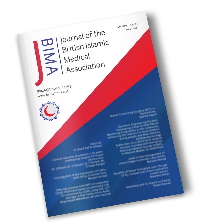
A chaplain is an individual that provides religious and pastoral care within an organised setting ranging from Hospitals, Universities, Prisons and military and recently airports and supermarkets.
In the NHS, the NHS Occupation Standards define the purpose of a chaplain is to ‘enable individuals and groups in a healthcare setting to respond to the Spiritual and emotional needs and to the experiences of life and death, illness and injury, in the context of a faith or belief system’.(1)
It is important to note the term ‘chaplain’ does not exist in the Islamic faith – the term ‘Muslim Chaplain’ has been taken form the Christian word ‘Chaplain’ and adapted for Chaplains working for Muslim faith communities.
The development and growth of Muslim Chaplaincy
Two crucial points indicate the development of Muslim Chaplaincy: firstly, as a result of migration, hospitals started to welcome volunteers from other communities to come visit patients of their faith which otherwise would have been visited by the Christian hospital chaplain, termed ‘chaplaincy faith volunteer visitors’ their main duties were to visit patients, arrange prayer provisions for the hospital trust and sometimes act as an advisory role to staff and management on faith issues such as halal hospital food.
Secondly, the 1991 ‘Patient Charter’ prioritised the religious and spiritual needs of patients, regardless of faith tradition: the charter laid down standards and targets for healthcare services in the NHS UK, one of the nine standards was to ‘respect for privacy, dignity and religious and cultural beliefs’ this required healthcare setting to show how they met these requirements and Chaplaincy was one source of ensuring this was done. This was a crucial time for Muslim chaplaincy, it saw the shift from a volunteer visitor role to one of a paid a chaplain role, which meant the role, could now contribute more to patient care and Muslim chaplains were recognised as members of hospital Chaplaincy teams.
Today, we see Muslim chaplains pioneering the way for ethical medical practice, we have male and female chaplains, chaplains have good knowledge and awareness of Islamic Medical Ethics enabling them to provide staff, patients and families with knowledge and information to make decisions in hospital treatment.
Some Chaplains are qualified religious scholars (Allim or Allima) and currently we have a Mufti who works as a Muslim Chaplain, Mufti Zubair Butt contributes and advises regularly on medical ethics and recently issued a Fatwa regarding Organ donation.
The approach the Chaplains use is to work closely with healthcare teams and support them to deliver informed healthcare outcomes and choices for Muslim families, where necessary using Islamic teachings. For example, our Islam and Chronic Pain leaflet supported the Physiotherapy department in engaging Muslim patients in physiotherapy exercise as there was a high level of DNA’s from Muslim patients, using Islamic teachings relating to seeking treatment and maintaining good health, a leaflet was written to encourage patients to access rehabilitation treatments to help maintain good health and wellbeing. Similar leaflet was written for Born in Bradford, this time to increase the cohort of Muslim Families to participate in healthcare research, this saw a significant increase in the recruitment from the Muslim community, which was ideal because the research will directly impact on health issues relating to Muslim families e.g.: Diabetes and Asthma.
In an advisory role, Chaplains in Bradford also provide regular support to the Psychology team to help them support patients with mental health, depression and anxiety, advising them on religious and cultural considerations relating to mental health
They contribute to hospital policies and guidelines both locally and on a national level eg: Department of Health ‘Bare below the elbows’ guidelines. Muslim chaplains Mohammed Arshad and Maryam Riaz contributed to amendments to include modest alternatives for Muslim staff and regularly advise on Professional Appearance Policy, Diabetes and Fasting, Diet and Fasting and selection of Halal alternatives in medicine and vaccines.
In a pastoral role, Muslim Chaplains support senior doctors when they have to break bad news to families; they play a role in doctor’s consultations and considerations for treatment by being involved in MDT’s and staff de-briefs discussing withdrawing of treatment, switching life support machine, organ donation, halal medicine.
Additionally, many chaplains also deliver lectures/training days for nursing and medical teams on topics of medical ethics and religious considerations e.g.: West Yorkshire Cancer Study, Martin House Hospice Equality and Diversity Training for staff, Ramadhan Awareness Training, Mental Health/Psychology study days.
The pioneering work of Chaplains is making faith accessible to all, one may say Muslim chaplains are humble in their contributions but their work certainly sets the foundation for staff and clinicians to uphold Islamic ethics in clinical practice.
References:

